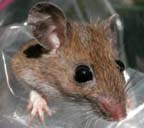 Researchers at the University of Illinois found the protozoan parasite Toxoplasma gondii even in the far reaches of a 1,500 acre park in central Illinois. Toxoplasma reproduces only in cats, but it can cause illness and death in other mammals, including humans.
Researchers at the University of Illinois found the protozoan parasite Toxoplasma gondii even in the far reaches of a 1,500 acre park in central Illinois. Toxoplasma reproduces only in cats, but it can cause illness and death in other mammals, including humans.
The researchers found plenty of feral housecats on the site, but no bobcats. There were more cats near human structures in the park than elsewhere. About a third of the cats found in the park were infected with Toxoplasma. As for the infection rates of the other animals, animals with large home ranges, such as opossums, had a higher rate of infection than those with small home ranges, such as mice. The small-home range animals that lived at the edges of the park or near structures had a higher rate of infection than those in the remote areas of the park. But even animals with small home ranges living in those remote areas were sometimes infected.
Read the paper, or at least the abstract, in the Journal of Wildlife Diseases, here.
Find the press release from the University of Illinois on EurekAlert, here. And a slide show of the research, here.
Photo: White-footed mouse, a disease sentinel in the study. Credit: Illinois Natural History Survey
